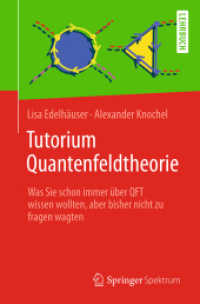- ホーム
- > 洋書
- > 英文書
- > Literary Criticism
Full Description
The Epicurean teacher and poet Philodemus of Gadara (c. 110-c. 40/35 BC) exercised significant literary and philosophical influence on Roman writers of the Augustan Age, most notably the poets Vergil and Horace. Yet a modern appreciation for Philodemus' place in Roman intellectual history has had to wait on the decipherment of the charred remains of Philodemus' library, which was buried in Herculaneum by the eruption of Vesuvius in 79 AD. As improved texts and translations of Philodemus' writings have become available since the 1970s, scholars have taken a keen interest in his relations with leading Latin poets.
The essays in this book, derived from papers presented at the First International Symposium on Philodemus, Vergil, and the Augustans held in 2000, offer a new baseline for understanding the effect of Philodemus and Epicureanism on both the thought and poetic practices of Vergil, Horace, and other Augustan writers. Sixteen leading scholars trace his influence on Vergil's early writings, the Eclogues and the Georgics, and on the Aeneid, as well as on the writings of Horace and others. The volume editors also provide a substantial introduction to Philodemus' philosophical ideas for all classicists seeking a fuller understanding of this pivotal figure.
Contents
Acknowledgments
Abbreviations
Introduction (David Armstrong)
I. Early Vergil
1. Vergil's Farewell to Education (Catalepton 5) and Epicurus' Letter to Pythocles (Diskin Clay)
2. Philosophy's Harbor (Francesca Longo Auricchio)
3. Vergil's Epicureanism in His Early Poems (RÉgine Chambert)
II. Eclogues and Georgics
4. Consolation in the Bucolic Mode: The Epicurean Cadence of Vergil's First Eclogue (Gregson Davis)
5. A Secret Garden: Georgics 4.116-148 (W. R. Johnson)
6. Vergil in the Shadow of Vesuvius (Marcello Gigante)
III. The Aeneid: The Emotions
7. The Vocabulary of Anger in Philodemus' De ira and Vergil's Aeneid (Giovanni Indelli)
8. Anger, Philodemus' Good King, and the Helen Episode of Aeneid 2.567-589: A New Proof of Authenticity from Herculaneum (Jeffrey Fish)
9. Philodemus: Avocatio and the Pathos of Distance in Lucretius and Vergil (Frederic M. Schroeder)
IV. The Aeneid: Piety and the Gods
10. Piety in Vergil and Philodemus (Patricia A. Johnston)
11. Vergil's De pietate: From Ehoiae to Allegory in Vergil, Philodemus, and Ovid (Dirk Obbink)
12. Emotions and Immortality in Philodemus On the Gods 3 and the Aeneid (Michael Wigodsky)
V. The Aeneid: Aesthetics
13. Carmen inane: Philodemus' Aesthetics and Vergil's Artistic Vision (Marilyn B. Skinner)
14. Vergil and Music, in Diogenes of Babylon and Philodemus (Daniel Delattre)
VI. Other Augustan Poets
15. Horace's Epistles 1 and Philodemus (David Armstrong)
16. Varius and Vergil: Two Pupils of Philodemus in Propertius 2.34? (Francis Cairns)
Bibliography
Contributors
Index






